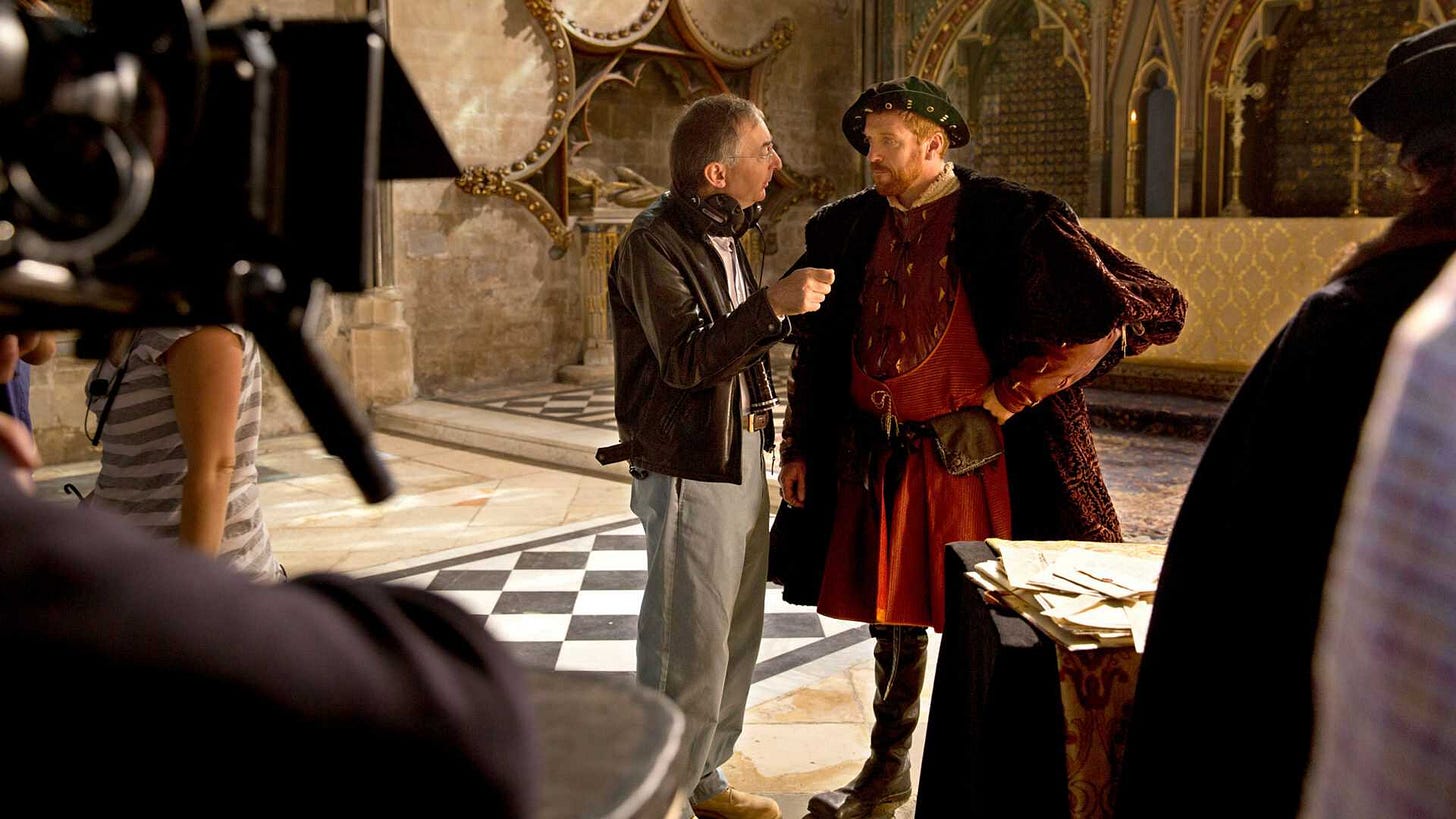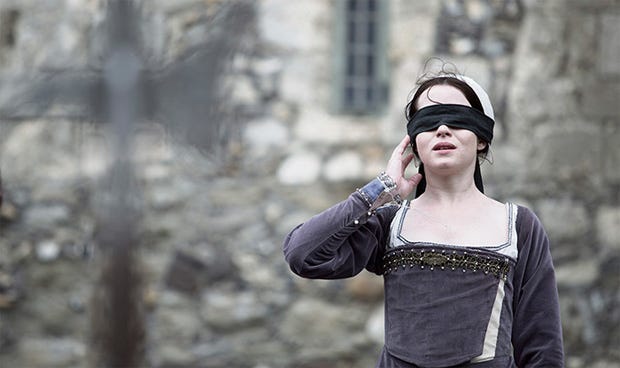Mirrors and Lights
Hilary Mantel & Marshall McLuhan illuminate our digital moment
It’s not clear from public interviews if British novelist Hilary Mantel has read Canadian media theorist Marshall McLuhan. But hints crop up throughout her Wolf Hall trilogy, which address the court of King Henry VIII through the lens of his adviser and fixer, Thomas Cromwell. Cromwell is tasked with releasing the king from a series of ill-fated marriages. Besides being compelling novels in their own right, Mantel’s work chronicles a society’s rapid shift from oral to literary media. Between the lines, Mantel reveals that our contemporary media environment is not as unique as we wish to believe.
The world Mantel describes is heavily oral in key ways. Everyone is a gossip. One’s business is implicitly assumed to be the business of everyone else. Context collapse is rampant. Misinformation dominates London: everyone knows that the rumors they’re repeating may not be completely accurate, but it doesn’t matter: they’re salacious, funny, and hard to ignore. Did Queen Anne really sleep with her brother? One doesn’t know, but can imagine it. The rumors convey some deeper truth about the world beyond their factual backing.
There is absolutely no space for privacy in Mantel’s court settings: at Hampton Court Palace, or at any of the expansive manor homes of York and Kent, you are constantly under conversational scrutiny. When private moments occur, they do so within an observable framework: the king takes an afternoon turn with a lady in the garden, and everyone cranes their necks to catch glimpses from the windows. This dynamic is just as true in the lower social orders, who have even less private personal space.
But these oral social dynamics happen against the backdrop of a rapidly changing media environment. McLuhan’s famous dictum “The medium is the message,” described how new media don’t just carry content, but are themselves messengers of new modes of reality. The psychodramas Mantel sketches are structured by the new forms of media available to the public.
As the trilogy begins, Cromwell and other closet Protestants in England are the beneficiaries of the new print industry. Books are smuggled into the country in sacks of grain, and religious tracts are surreptitiously distributed from hand to hand. In this world, communication of sacrilegious thoughts threatens the regime by creating the possibility of a disjunct between one’s formal loyalty and private skepticism. As McLuhan put it, “print created individualism.” In the previous oral culture, this kind of interiority didn’t exist - suddenly it’s available to anyone literate, creating sudden precarity for the church, state, and all authoritative institutions.
Cromwell is himself directed to uncover secret heresy in Thomas More, assumed to be a silent opponent of the king’s remarriage, even as Cromwell himself harbors a host of skepticisms. Mantel’s More is a nasty character, committed to a pompous self-conception, a world apart from his saintly depiction in Catholic tradition. In Mantel’s world, oral and literary performance of orthodoxy is the only thing that can save you, and More is a vestige of a bygone era.
In a very modern way, Mantel’s Cromwell is committed to his own brand creation. An ambitious man of low birth, he does not have the benefit of an existing brand in the form of a family name or title of nobility: he is forced to generate his own narrative, his own crowd of parasocial hangers-on, his own mystique.
Cromwell’s great advantage lies in his grasp of new media, and instinctive understanding of how they shape his world. He is a master of the new tools, of the verified word on paper which holds legal and symbolic power. A lawyer by trade, he becomes invaluable to the king for his ability to transform offhand comments and unguarded asides into cold, written, legal fact. Time and again, Cromwell grasps what his enemies don’t; a statement in an oral society is a completely different entity in a freshly literary society. The joke you made a year ago, attested to by two witnesses in writing, becomes the treasonous statement which dooms you.
McLuhan claims the medium of the last technological era is always transformed into the content of the following era’s medium. Chatter and gossip are the material conveyed in a completely new format by legal, written text. Cromwell is at first the wielder of this power, and gradually is captured and destroyed by it: he too has made offhand comments, and created enemies who can read them into a transcript as proof of ill intent towards the king.
Perhaps the key difference between Cromwell’s way of social manipulation and our own is Cromwell’s continued openness to sensory experience. In an appealing way, Cromwell is regularly pulled out of his wheeling and dealing by jolts of experience and memory: smells of flowers, or the memory of a dead daughter wearing homemade angel wings. Mantel is a master of these moments. Cromwell is trapped: too good at operating the tools of his modern world to leave it, but haunted by dreams of a past filled with pre-literary meaning.
These dreams of return are everywhere: King Henry is himself captured by a desire to escape. He constantly dreams of an Arthurian era where the sovereign could busy himself with raw and visceral adventure, rather than a domain in which his every movement, down to his bowels, is tracked and accounted for. Henry proposes wishful day trips, momentary escapes in which he can sneak down to the blacksmiths in disguise. Even as he proposes them, he is subconsciously aware that they are a pipe dream. His world no longer has room for the real. Instead, Henry attempts to satisfy himself with ever fluctuating romantic interests. The real, true love he believes he seeks is always just out of his reach, driving the whirlwind of destruction and death that animates the novels.
As commentators have noted, today’s media environment uneasily bridges the oral and literary divide. Our social media culture is oral in its speed, affordance for rumor, and virality, literary in its permanence and need for public and private faces. Another McLuhan aphorism: “We drive into the future using only our rearview mirror.” What McLuhan is arguing for explicitly is what Mantel suggests implicitly: that early modern history, in particular that which engages with actual human experience, is a crucial lens for understanding our contemporary media reality. For McLuhan, fiction is an ideal mode for understanding the effects of technology, which “do not occur at the level of opinions or concepts, but alter sense ratios or patterns of perception steadily and without any resistance.” Only a serious artist, an expert aware of changes in sense perception, can “encounter technology with impunity.” Mantel’s concluding Wolf Hall novel is titled The Mirror and the Light; a 2010 collection of McLuhan’s writing is called The Medium and the Light; whether serendipitous or purposeful, it’s yet another signpost. In a digital world of amateur media theorists, we might be better off listening to McLuhan, and letting the artists guide us.





Fictionpilled again.